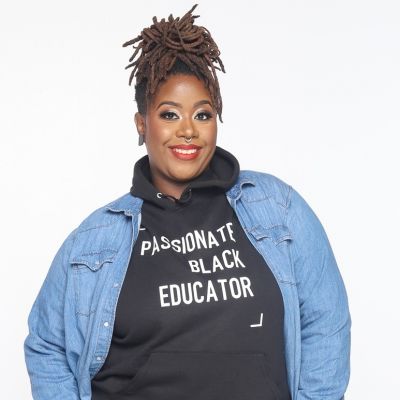
Jasmine M.T. Fripp
KIPP Nashville Collegiate High School
Nashville, Tennessee
“Passion and excellence are contagious, transparency breeds trust, and structure brings stability,” says Jasmine M.T. Fripp, the Director of Choral Activities and General Music at KIPP Nashville Collegiate High School.
Fripp walks into every rehearsal with excitement and a genuine love for the art of music-making. Not only does she hold her students to a very high level of excellence, she finds ways through music to showcase the beauty in Black and Brown cultures. “Because I create structure through planned rehearsals, retreats, performances, choir outings and trips, kids take the music program as seriously as I do,” she explains. “They understand what we do as an ensemble has purpose and goals to achieve.”
She finds ways to weave history, culture and issues of social justice into her general music program. “Within my general music classes, we study Black and Latinx cultures through music,” she says. “We talk about how Black and Latinx cultures either laid the foundation for or had a large impact on various music genres. We also discuss heavier topics like cultural appropriation, protest songs, racism and colorism in the music industry. Lastly, I teach students how to fight for social justice through music and other talents.”
Her mission to have more diversity and inclusion in the world of music education led Fripp to create The Passionate Black Educator, which “aims to advocate for students of the global majority by providing opportunities to learn and advance through music, fine arts and education,” she says. The organization empowers music educators of all cultural backgrounds to create student-centered classroom environments that promote anti-racism, culturally responsive pedagogy and healing-centered teaching.
Not surprisingly, Fripp is a sought-after clinician for her work in music education and anti-racist pedagogy. Some of the main messages she teaches through her presentations include:
- Music from Black, Brown, Indigenous and Asian cultures hold just as much educational value as Euro-centric music. If you don’t know about cultural music, don’t be afraid to seek out experts and resources.
- Becoming an anti-racist music educator is a continuous process that cannot be done by simply checking off a list of “anti-racist deeds.”
- Racism and white supremacy culture in music education negatively impacts students and teachers.
- There is beauty in solidarity. Make it mandatory in your music classroom.
Fripp came to the attention of many music educators in 2020 when she posted “With Love, Letters to my Fellow White Music Colleagues” on Facebook. She explains that during her reflection time following the murder of George Floyd, she thought of “all the inequities that I witnessed within music education and how it impacted my Black and Brown students, and me. For years, I suppressed my feelings and kept my observations to myself, but through this letter, I finally dared to say, ‘enough is enough.’”








